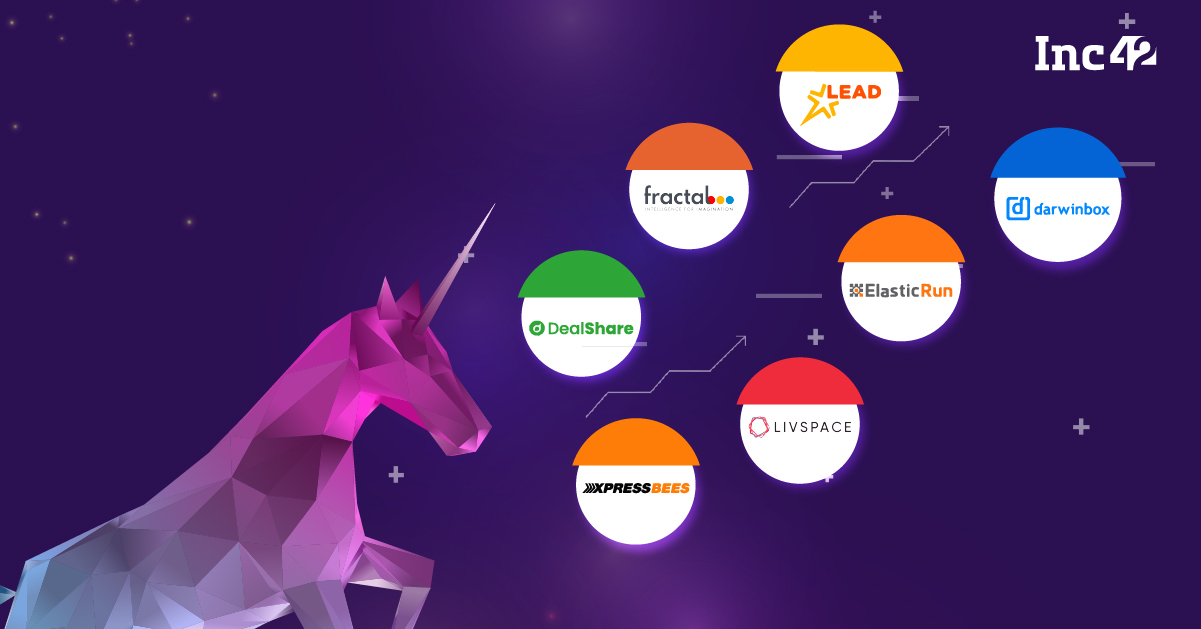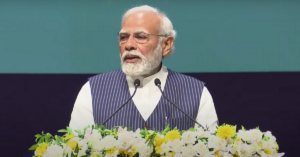Not even two months into 2022, India has already seen seven new unicorns — Fractal, LEAD, Darwinbox, DealShare, ElasticRun, Livspace and Xpressbees
The total count of Indian tech startups that have entered the unicorn club to date stands at 93
These unicorns have raised a total of $77.4 Bn in funding to date and are valued at $295.5 Bn combined
The year 2022 has continued right off the bat from the record-breaking 2021. Not even two months into 2022 and India has seen seven startups entering the unicorn club. These 93 Indian unicorns have raised a total of $77.4 Bn in funding to date and are valued at $295.5 Bn combined.
The breakdown of the data by Inc42 reveals that Indian startups raised $4.6 Bn in January 2022 alone. January 2022 recorded a YoY 5X increase in funding amount. While January saw the entry of four startups in the unicorn club, February has seen three startups achieve the billion-dollar valuation.
2021 was a blockbuster year for unicorns. It saw over 42 startups and 2 listed companies touching the billion-dollar valuation. The total count of Indian tech startups that have entered the unicorn club to date stands at 93. With Inc42’s soonicorn tracker putting 78 startups in the soonicorn club, India is poised to hit a century of unicorns in the next few weeks.
Indian Startups That Entered The Unicorn Club In 2022
Fractal
AI and advanced analytics solutions startup Fractal’s latest round of funding made it the first entrant into the unicorn club in 2022. The Private Equity round saw $360 Mn raised from TPG Capital Asia and secondary share purchase from funds advised by Apax Partners.
Fractal has raised a total of $685 Mn in funding over 5 rounds. The fresh investment comes almost two years after it had raised $200 Mn from Apax Partners in 2019. Fractal had also raised $100 Mn from Malaysian sovereign fund Khazanah in 2016.
It was founded in 2000 by a five-member team including IIM Ahmedabad alumni Srikanth Velamakanni and Pranay Agrawal, along with Nirmal Palaparthi, Pradeep Suryanarayan, and Ramakrishna Reddy. The 21-year-old startup provides artificial intelligence and advanced analytics solutions to Fortune 500 companies. Fractal Analytics is among a handful of companies that have taken over two decades to enter the unicorn club at a time when Indian startups are crossing the billion-dollar valuation in 6.6 years.
LEAD
Mumbai-based startup LEAD was the first edtech startup to enter the Indian unicorn club in 2022. The company has raised $100 Mn in a round led by WestBridge Capital and GSV Ventures in January positioning it at a valuation of $1.1 Bn.
This was the company’s fifth funding round, the last one coming in April 2021. LEAD School has raised a total of $166 Mn in funding over 5 rounds. In 2021, edtech startups raised over $4.7 Bn to emerge as the third-most funded Indian startup sector of 2021, with only ecommerce ($10.7 Bn) and fintech sectors ($8 Bn) attracting more investment.
LEAD is an edtech startup founded in 2012 by Sumeet Mehta and Smita Deorah. The company enables schools to combine technology, curriculum, and pedagogy into an integrated teaching and learning system. It is the country’s sixth edtech unicorn after BYJU’s, Unacademy, Eruditas, UpGrad, and Vedantu. LEAD claims to have more than 5,000 schools from across 500 Indian cities on board, serving more than 2 Mn students.
Checkout The Indian Unicorn Tracker
Darwinbox
Hyderabad-headquartered Darwinbox raised $72 Mn in a funding round led by Technology Crossover Ventures (TCV) in January this year making it the third Indian unicorn minted in 2022. Existing investors like Salesforce Ventures, Sequoia India, Lightspeed India, Endiya Partners, 3one4Capital, JGDEV and SCB 10X also participated in the round.
Last year in January, it had raised $15 Mn in funding led by Salesforce Ventures. It had raised another $15 Mn from Sequoia Capital in 2019 and $4 Mn in a Series A round in 2017. To date, it has raised a total of $107 Mn in funding over 7 rounds.
Founded in 2015 by Chaitanya Peddi, Jayant Paleti and Rohit Chennamaneni, Darwinbox is a cloud-based HRtech startup that enables enterprises to automate the entire employee lifecycle in one HR platform. It caters to companies’ HR needs across recruitment, onboarding, core transactions (leaves, attendance, directory), payroll, travel and people analytics among others.
The company claims to have around 500 enterprises and large tech companies as clients in India and Southeast Asia, including the likes of Tokopedia, Indorama, Zilingo, Fave, Adani, Mahindra, Kotak, TVS, National Stock Exchange, Ujjivan Small Finance Bank, Swiggy, Bigbasket and others.
The global HRtech market was valued at $22.89 Bn in 2020. It is projected to grow from $24.04 Bn in 2021 to $35.68 Bn in 2028 at a CAGR of 5.8% during the period. According to estimations, India accounts for $3.6 Bn of that market in 2021.
DealShare
The Indian social commerce segment is poised to grow at a compound annual growth rate (CAGR) of 55%-60% to reach $16 Bn-$20 Bn gross merchandise value (GMV) by 2025. The segment’s biggest milestone last year was Meesho’s entry into the unicorn club.
2022 saw Dealshare entering the unicorn club at a valuation of $1.62 Bn. The Bengaluru-based social commerce startup raised $165 Mn in a Series E funding round. The round saw participation from existing investors Tiger Global and Alpha Wave Incubation, alongside new investors Kora Investment, DF International Partners and Twenty Nine Capital Partners.
With the current round, DealShare has raised around $330 Mn to date. The startup’s valuation has more than tripled since its last fundraise in July 2021. The startup’s gross revenue has increased by 10X over the last year with an ARR of $750 Mn for FY22.
Founded in September 2018 by Vineet Rao, Sourjyendu Medda, Sankar Bora and Rajat Shikhar, DealShare is a social ecommerce marketplace. It enables first-time internet users to shop online, targeting the middle-class population. The startup sells grocery and household essential products through social media and messenger platforms like WhatsApp.
It uses two ways to bring down the cost of essential products for the mass market segment — directly sourcing household items of lesser-known brands and selling products via community sales.
ElasticRun
Pune-based ElasticRun was the first startup to enter the unicorn club in February. The Kirana commerce startup raised $300 Mn in a fresh round of funding led by Masayoshi Son’s SoftBank. It also saw the participation of New York-based Goldman Sachs, Prosus Ventures (earlier known as Naspers Ventures), Innoven Capital, and Abu Dhabi’s Chimera Investment, a subsidiary of Abu Dhabi’s Royal Group.
As per Inc42’s estimates, the Series E round valued ElasticRun at around $1.5 Bn. The new investment comes almost a year after it had raised $75 Mn in a Series D funding round led by Avataar Venture Partners. The round also saw participation from Prosus Ventures, and Kalaari Capital among others. The round valued the startup at around $400 Mn. This means that the latest funding has thrust the startup’s valuation by 3.75X.
Founded in 2016 by Sandeep Deshmukh, Saurabh Nigam and Shitiz Bansal, ElasticRun’s tech platform acts as an extended arm of FMCG companies’ direct distribution networks in rural areas and enables these businesses to reach small Kirana stores in the hinterland. The startup also engages with banks and financial institutions to give them access to underserved SME customers from its Kirana network. Through data analytics, the platform also helps Kirana businesses sharpen their marketing strategy.
Checkout The Indian Unicorn Tracker
Livspace
Home renovation and interiors platform Livspace became the sixth unicorn of the year. The Series F round saw $180 Mn raised from American investment giant KKR & Co, Swedish retail giant Ikea, Jungle Ventures, Venturi Partners and Peugeot Investments. Livspace has raised close to $450 Mn across 10 funding rounds.
This is the company’s second major round in the past 15 months after it raised $90 Mn in Series D in September 2020, led by Switzerland-based investment firm Kharis Capital and consumer space-focused Venturi Partners. Late last year also saw the French multinational giant Saint-Gobain acquiring a minority stake in the startup.
The Bengaluru-based startup was founded in 2014 by Anuj Srivastava and Ramakant Sharma. Livspace is a curated marketplace that provides an end-to-end home design experience. The startup’s online marketplace also offers software tools that can help designers and homeowners design interiors.
Xpressbees
The Pune-based startup is the latest entrant to the Indian unicorn club of 2022. It raised $300 Mn in its Series F funding round led by private equity funds Blackstone Growth, TPG Growth and ChrysCapital. Existing investors, Investcorp and Norwest Venture Partners also participated in this round. Xpressbees’ total funding touched $500 Mn, putting the company at a valuation close to $1.2 Bn. India now has four logistics unicorns including Delhivery, Rivigo and BlackBuck.
The investment comes almost two years after it had raised $110 Mn in its Series E funding round from Investcorp, Norwest Venture Partners, and Gaja Capital. The round valued the startup at around $400 Mn. This means that the latest round of funding has pushed Xpressbees valuation by 3X.
Founded in 2015 after being spun off from ecommerce giant FirstCry, Xpressbees is an ecommerce logistics company that offers express delivery services. It is present across 3,000 cities, serving over 20,000 pin codes, and delivers over 1.5 Mn packages per day.
Xpressbees currently has 100 hubs across India with over 10 lakh sq ft warehouse capacity and operates across 52 airports in the country. Firstcry also runs GlobalBees – a thrasio styled roll up company that entered the unicorn club last year.
This is a running article. The story will be updated as more unicorns are added to the list…










